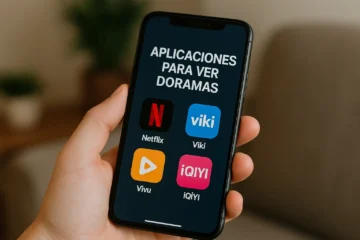English learning apps for kids without internet
Advertisement advertisements
We present the 5 best apps to learn English for kids without Internet and we explain how to download them to take advantage of their benefits.
Today, learning English has become a fundamental skill for children, as it opens up many academic and professional opportunities for them in the future.
In addition, thanks to technology, learning English can be an interactive and entertaining process.
However, an Internet connection is not always available, either while traveling or in places with limited network access.
Fortunately, there are applications that allow children to learn English without having to be connected to the Internet.
Details about offline English learning applications
Offline English learning apps are tools designed to allow children to practice the language anywhere, anytime, without relying on a constant connection to the Internet.
These apps often include downloadable lessons, interactive activities and educational games that teach vocabulary, grammar and pronunciation in a fun and effective way.
One of the great advantages of these applications is that, once the content is downloaded, children can access it without the Internet, which facilitates learning while traveling or in areas with limited access.
In addition, these applications often have progression systems that help parents monitor their children's progress and identify areas in which they need to improve.

5 Best apps to learn English for kids without Internet
Here are the five best apps that allow children to learn English offline, ideal for your children to continue learning the language on the go.
1. Duolingo Kids
Duolingo Kids is an adapted version of the original Duolingo application, focused on learning English for children.
This application is designed to teach English in a fun and interactive way, using games, images and activities that capture children's attention.
One of the great advantages of Duolingo Kids is that it allows you to download lessons for offline access, which makes it ideal for use while traveling or in areas where internet is not available.
The lessons are divided into small modules that teach vocabulary, simple phrases and pronunciation through entertaining activities.
The gamified reward system, such as earning points and unlocking new levels, motivates children to continue learning and completing lessons.
Each lesson is designed to be short, keeping children's attention without overwhelming them.
In addition, Duolingo Kids uses the "spaced repetition" approach, which reinforces learning by repeating words or phrases periodically to ensure that children memorize them over the long term.
Main functionsShort lessons, interactive games, reward system and basic vocabulary.
Ideal usersChildren from 4 to 10 years old who are beginning to learn English.
Pros:
- Friendly and colorful interface that attracts children's attention.
- Allows offline access to lessons, ideal for travel or places without internet.
- Rewards motivate children to continue learning.
Cons:
- The content is basic and geared more towards beginners, so it may not be suitable for children with intermediate or advanced English skills.
Specific functionalities:
- Educational games to teach basic vocabulary.
- Leveled progression with rewards that motivate learning.
- Downloadable lessons for offline use.
Where to download: Google Play Store, App Store.
PriceFree with in-app purchase options for additional features.
2. Lingokids
Lingokids is one of the most complete applications for teaching English to young children.
This platform not only offers vocabulary and grammar lessons, but also includes a wide variety of educational games, songs and interactive activities that help children learn English in a fun way.
One of the most outstanding features of Lingokids is that it allows you to download activities and games to use them without an internet connection.
Lingokids adapts the content to the child's age and learning level, allowing for a personalized and progressive experience.
The app also includes a "School Mode", which allows parents and teachers to track the child's progress, which is ideal for making sure they are making progress in learning the language.
In addition, Lingokids introduces concepts gradually, making it easier for children to assimilate new vocabulary without feeling overwhelmed.
The interactive activities in Lingokids are designed to improve both vocabulary and listening comprehension.
The platform includes mini-games that help children associate images with words and phrases, which facilitates the retention of new vocabulary.
Main functionsEducational games, songs, vocabulary and grammar lessons, progress monitoring.
Ideal usersChildren from 2 to 8 years old who are just starting to learn English.
Pros:
- Attractive and easy-to-use interface for young children.
- Possibility to download lessons and games for offline use.
- Extensive educational content covering vocabulary and grammar.
Cons:
- The free version has limited access to lessons, and some advanced features require a subscription.
Specific functionalities:
- Interactive games to learn vocabulary and grammar.
- Educational songs and videos.
- Progress tracking system for parents and teachers.
Where to download: Google Play Store, App Store.
PriceFree with in-app purchase options.
3. Fun English
Fun English is an application designed to teach English to children through interactive games and themed activities.
The app covers a wide range of topics, such as colors, numbers, animals and food, making it an ideal tool for children who are just starting to learn English.
The ability to download lessons for offline access makes Fun English a perfect choice for use anytime, anywhere.
Fun English uses animated characters and colorful graphics to keep children's attention, making it very entertaining for the little ones.
The games are designed to be simple and easy to understand, which helps children associate words and concepts naturally.
In addition, the games include pronunciation activities that help improve listening and speaking skills.
An interesting feature of Fun English is that it allows parents to set up profiles for each child, so that they can track their learning progress and adjust the activities to their level of knowledge.
Main functionsEducational games, thematic activities on basic vocabulary, pronunciation exercises.
Ideal usersChildren from 3 to 10 years old who are beginning to learn English.
Pros:
- Interactive and colorful games make learning fun.
- Lessons can be downloaded for offline use.
- Simple and effective activities to teach basic vocabulary.
Cons:
- The free version has limited access to some lessons and topics.
Specific functionalities:
- Themed games and activities on colors, numbers and animals.
- Pronunciation exercises to improve listening comprehension.
- Personalized progress by user profile.
Where to download: Google Play Store, App Store.
PriceFree with in-app purchase options.
4. Learn English Kids: Playtime (British Council)
Learn English Kids: Playtime, developed by the British Council, is an educational application that focuses on teaching English through games, songs and animated videos.
Although internet is required to download the content initially, once downloaded, children can access the activities offline.
This feature makes it an ideal choice for those looking to learn without interruptions while on the move.
The app offers a series of educational videos where animated characters teach vocabulary and everyday situations in English.
It also includes songs that children can sing to improve their pronunciation and memory.
The content is designed to be fun and immersive, keeping children entertained while they learn.
Learn English Kids also allows parents to create profiles for each child, making it easy to track progress.
The British Council, as a leader in English language teaching, guarantees the quality and effectiveness of the educational content in this application.
Main functionsEducational videos, songs, interactive games.
Ideal usersChildren from 5 to 12 years old who are beginning or improving their English learning.
Pros:
- Developed by the British Council, an authority on English language teaching.
- Activities can be downloaded for offline use.
- Content specifically designed to improve listening comprehension and pronunciation.
Cons:
- Some advanced features require a subscription.
Specific functionalities:
- Educational videos with everyday situations.
- Interactive songs and games to reinforce vocabulary.
- Progress tracking through user profiles.
Where to download: Google Play Store, App Store.
PriceFree with in-app purchases.
5. English for Kids (Alisa)
English for Kids, developed by Alisa, is an application that teaches English through educational games and interactive activities that focus on vocabulary and pronunciation.
The app allows children to access downloaded content without an internet connection, making it an excellent option for learning at any time, even in areas without network access.
English for Kids is designed specifically for children ages 3 to 8 and uses a methodology based on repetition and word picture association to teach basic vocabulary.
The games include word association activities, pronunciation exercises and challenges that allow children to learn progressively.
In addition, the application's graphics and interface are appealing to young children, ensuring that they stay engaged in the learning process.
Main functionsEducational games, vocabulary and pronunciation exercises, word association activities.
Ideal usersChildren from 3 to 8 years old who are beginning to learn English.
Pros:
- Interactive games that facilitate the learning of basic vocabulary.
- Allows you to download content for offline use.
- Attractive visual design and easy to use for young children.
Cons:
- Some lessons are limited in the free version.
Specific functionalities:
- Interactive games on topics such as colors, numbers and animals.
- Pronunciation exercises to improve listening comprehension.
- Personalized progress and learning follow-up.
Where to download: Google Play Store, App Store.
PriceFree with in-app purchases.
What to expect and what not to expect from offline English learning apps?
It is important to know what to expect from these applications to take full advantage of their functionality and to recognize their limitations.
What to expect:
- Offline accessOnce the content is downloaded, children can access the lessons at any time.
- Learning progressionMost applications adjust the level of difficulty according to the child's progress, ensuring personalized learning.
- Variety of activitiesThe apps offer games, songs and exercises designed to keep children motivated.
What not to expect:
- Real time updateApplications cannot be updated or offer new content without an Internet connection.
- Live interaction: They do not offer real-time interaction with teachers or peers.
- Automatic synchronization: Progress is not synchronized between devices if there is no internet connection.
Offline English learning apps for kids are effective tools that allow children to continue learning English in an interactive and fun way, regardless of whether they are connected to the Internet or not.
Applications such as Duolingo Kids, Lingokids and Fun English offer downloadable lessons that ensure that learning is never interrupted.
If you are looking for a way for your children to learn English in an accessible and entertaining way, these apps are a great option.
Download them today and start exploring the world of English with them!





